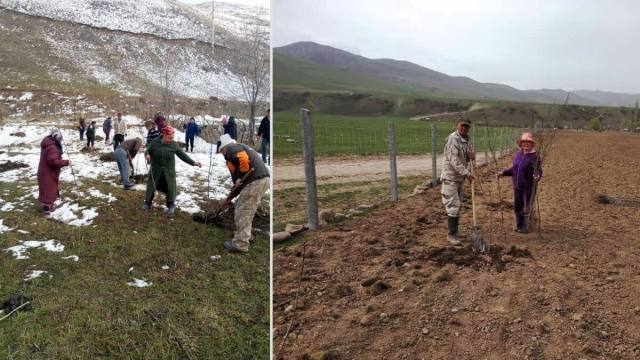These bees were delivered to communities living near snow leopard habitat as part of a new project that will bring additional revenue sources to the local livestock herders. Our goal is to help diversify the source of livelihoods for people to build resilience in the face of climate change. For many communities, this can help reduce economic reliance on livestock and decrease pasture degradation, addressing prominent threats to snow leopards in the Ala-Too Mountains. Diversifying peoples’ income sources can decrease their vulnerability to climate change impacts and increase their capacity to adapt to new challenges.
Currently, this project has two innovative initiatives co-created with communities – planting fruit orchards and beekeeping. We are excited to share that both are already underway in six participating communities, including Temen-Suu, Shamshy, Koshoi, Komsomol, Kyzyl-Dobo, and Kum-Dobo.

These initiatives are supported in part by The United Nations Environment Programme’s Vanishing Treasures project. The project seeks to help us better understand the direct impacts of climate change on snow leopards and their prey species and foster coexistence between humans and wildlife through community-based conservation.
Initial funding supported the delivery of plum, apple, apricot, and black currant seedlings to allow communities to start their orchards and fencing material to ensure the plants’ protection.
Fruit trees have already been planted across 10 hectares or about 25 acres in the six participating communities. These orchards will provide their first harvest after 2-3 years, but some less tangible benefits arrived more immediately.

Benazir notes, “It has been an amazing experience to see community members cooperatively plant the orchards. It was so much work. They had to prepare the plot, remove the rocks, and dig holes and trenches for water. After that, they had to fence the entire area before finally planting the seedlings. It was a wonderful communal effort that brought together women, men, children and the elderly. They brought food to share during lunch and brought blankets to relax on while they shared breaks – eating and talking. It is heartwarming to see everyone come together like this for a project that will ultimately benefit snow leopards and their habitat.”
These communities have committed to conservation. They signed agreements that allocate 50% of generated income from fruit sales and 20% from honey sales toward measures that will benefit both people and wildlife, including anti-poaching patrols, research cameras and pasture management.

Ensuring these conservation initiatives are community-led is critical to their success. Each participating community has established an Ecological Committee with members who will monitor the programs and help the community decide how to allocate profits from the sale of honey and fruits. These committees comprise representatives from various stakeholders: local government members, local parliamentarians, herders, students and teachers, and Snow Leopard Foundation of Kyrgyzstan (SLFK) officers, our country partner.
All conservation agreements developed and signed by all parties stipulate that Ecological Committee members include 40% representation by women. In the village of Kara-Suu, the community Beekeeping Committee is women-led and a majority of the participants are women. Both Snow Leopard Trust and UNEP are actively striving with our teams on the ground to ensure that women will continue to have decision-making power within their communities.
We look forward to the first batches of honey and fruit that will help people in the participating communities diversify their incomes and ultimately make great strides in the protection of snow leopards and other wildlife.
We express our gratitude to the United Nations Environment Programme and the Government of the Grand Duchy of Luxembourg for making the Vanishing Treasures project possible. This effort is also co-funded by IUCN Save Our Species. Its contents are the sole responsibility of Snow Leopard Trust and do not necessarily reflect the views of IUCN. Thank you to Snow Leopard Foundation of Kyrgyzstan and Global Snow Leopard and Ecosystem Protection Program for being key partners in this project. Huge thanks are also extended to the local communities in the Ala-Too for their participation and partnership.


This is wonderful news! So happy to know that the new conservation initiatives include bees, another endangered species, and whose survival we all depend upon. The bees and fruit tree initiative was hard work – thanks to everyone who made it happen!
What a great project! Awesome to hear the communities are coming together to work toward the future harvest. Hoping all goes well moving forward!
Excellent scientific approach where the community vision, working towards a common mission, allows to improve the social and environmental whole.